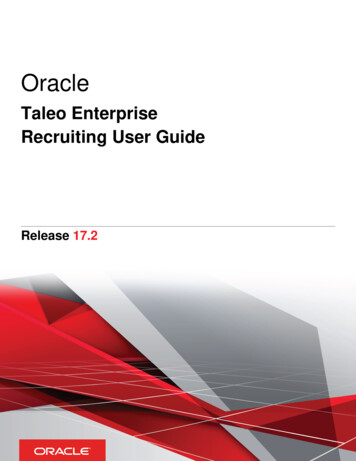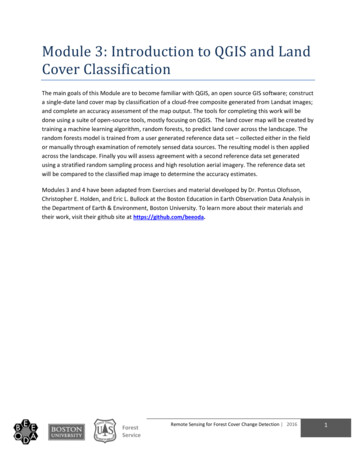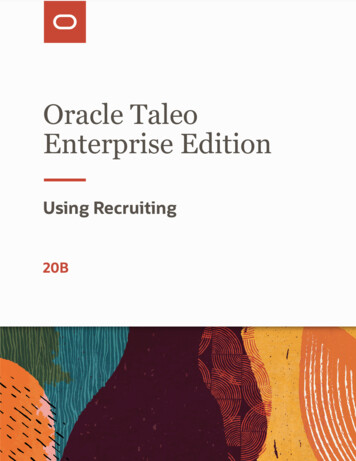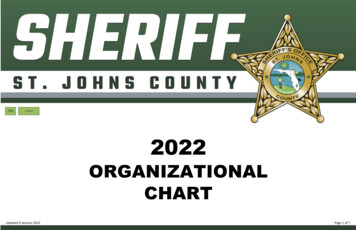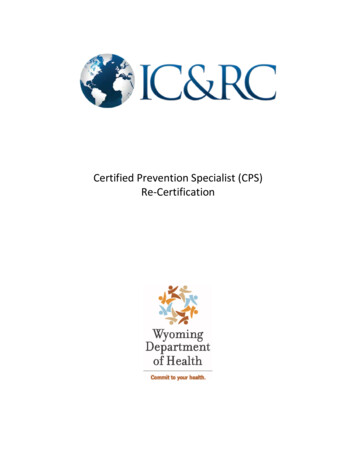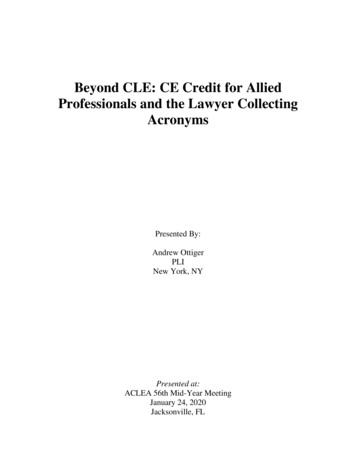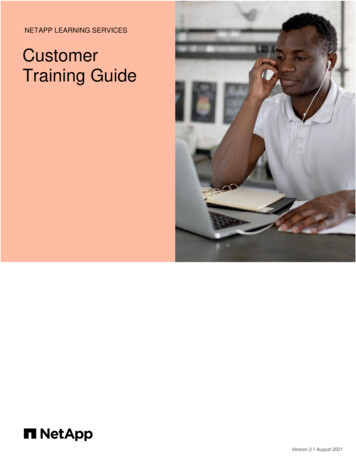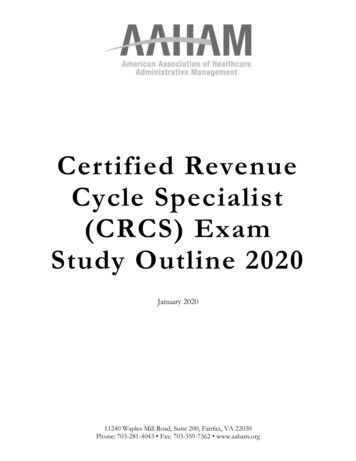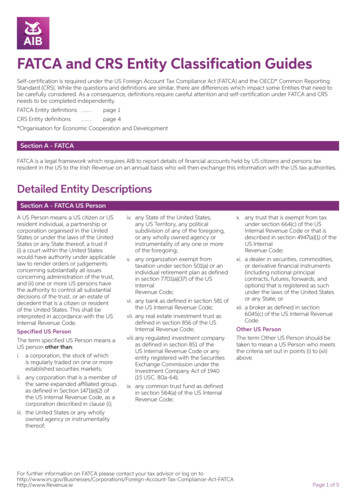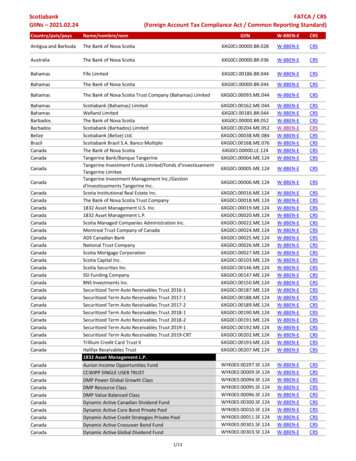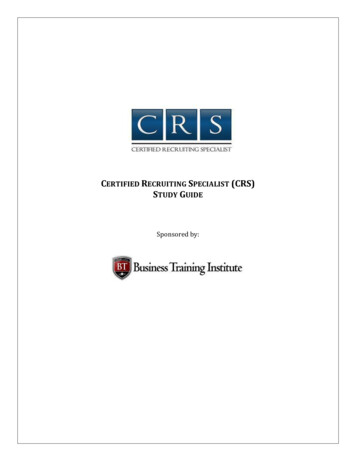
Transcription
CERTIFIED RECRUITING SPECIALIST (CRS)STUDY GUIDESponsored by:
TABLE OF CONTENTS:Please use this guide to assist in preparation for your Internet Marketing Specialist (IMS)examination.The contents of this study guide are as follows:I.II.An Overview of the Business Training InstituteCertified Recruiting Specialist (CRS) Program Details and TimelineIII.Required ReadingsIV.Certified Recruiting Specialist (CRS) Exam Preparation1. Exam Composition2. Book Summaries3. Sample QuestionsV.VI.VII.VIII.Four Modules and Corresponding KeywordsCRS Strategic Training Project InstructionsFrequently Asked QuestionsSample Question Answers1
1. BUSINESS TRAINING:The Business Training Institute is the leading online program for specialized niche businesscertification programs. The team behind the Business Training Institute is comprised of industryexperts in niches including online marketing, project management, public relations, consulting, andmany more.This experience, combined with our advisory board’s expertise in online education and training, iswhat makes it possible to provide the training and certification programs found on our website.The Business Training Institute is a global training and certification organization that has providedpractical industry-specific certification to over 15,000 clients from the United States, Europe, andmore than 75 other countries around the world.We provide high value training programs that provide function knowledge on very specificbusiness topics such as public relations, online marketing, project management, internationalbusiness, and consulting.The Business Training Institute’s Mission: To provide professionals with high impact businesstraining and certifications in niche subject areas that are functional and immediately beneficial.The Business Training Institute helps you to: Quickly gain specialized knowledge in highly valuable business niches.Enhance your credibility, resume, and overall value in the marketplace.Complete our training programs in 5 months from anywhere in the world.Our programs accept participants year-round and are flexible to work with your current workschedule and academic constraints. You can complete one of our programs in 2 months or 2 years;the choice is yours.MASTER’S CERTIFICATE PROGRAMS: The Business Training Institute is proud to offer several advancedMaster’s Certificates that require the completion of five programs from the Business Training Instituteplatform.To learn more about these Master’s Certificates and how to earn one, please see our . CRS DETAILS AND TIMELINE:PROGRAM DETAILS:The Certified Recruiting Specialist (CRS) certification program is unique in that it is modeledafter many online courses offered at Ivy League institutions today, offering more value for a morecost-effective program. The CRS Program is a self-study program that includes educational2
multimedia resources in video form, a study guide, required readings, and a flexible onlineexamination process, accessible around the world.The experts interviewed for this Recruiting Certification include:Adam Connors: Adam Connors is Managing Partner and founder of Spire SearchPartners. Mr. Connors has about 15 years of executive search and recruitingexperience. Now running his own executive search business which caters strictly tothe Wall Street community. Listen to this expert audio interview to learn about therecruiting best practices that he recommends that you follow.Yves Lermusi: Yves Lermusi is CEO of Checkster an online service for recruitersand job hunters. Checkster stands for giving individuals and organizations toolsthat will help them recognize and grow their talent. Checkster aims to improve theworld's productivity and harmony by increasing job fit and work achievement, aswell as personal career satisfaction and fulfillment. Within this interview Yvesprovides his best practices, insights, and advice on recruiting.Rick Gold: Rick Gold is an executive recruiter specializing in the financial servicesdirectory and partner at the First Call Associates recruitment team. Our traininginstitute has known Rick for a few years now and he has many lessons and ideasto share to help you become a more effective recruiter.Brian Kelly: Brian Kelly is a Senior Recruiter for Forester Research. At ForesterBrian is in charge of recruiting and staffing up their sales teams for this publiclytraded global organization. He helps with recruiting professionals for manydifferent offices around the globe. Brian is someone our training institute hasknown as a recruiting expert for the past five years and he shares a lot of great advice within thisaudio interview.Howard Adamsky: Howard Adamsky was selected as the last expert that to beinterviewed for this expert audio interview. We suggest you listen to this interviewas well as the others at least once during this program as it will help you review bestpractices for the examination and speed up the success of your recruiting businessand/or career.Certified Recruiting Specialist (CRS) Video Modules:1.Recruiting Responsibilities - Sourcing2.Recruiting Responsibilities – Screening3.Recruiting Responsibilities - Closing & Negotiating4.Human Resources Management Overview5.Human Resources Management: Acquiring6.Strategic Recruiting7.Internal Recruitment Best Practices8.Recruiting Agencies3
9. Warning Signs in Hiring10. Tips for Successful Networking11. Social Media in Recruiting12. Boomerang Employees13. Onboarding14. Online Recruiting15. Performance Profile16. Persuasive Writing (Copywriting) for Business Growth17. Work More Efficiently: Time Saving Business Tools18. How To Double Your Chances of Business Success19. How To Become a Doctor Within Your Business Field20. Knowledge Asset Management: A Competitive Advantage For Your Business21. Single Focus: The Key to Maximum Productivity22. Fertilize Your Brain23. Learning Before Outsourcing24. The Power of Positive Business Habits25. 5 Techniques to Efficiently Capture Your Business Ideas26. The Importance of Business Ethics to Your Success27. The Power of Inevitability Thinking in BusinessThe online exam is structured so that in order to complete the exam within the 2-hour time frameone must read through all of the assigned materials and conceptually understand the majority ofthe material to score well enough to pass the exam.Our goal is to offer the most challenging program in the industry while also providing all of thelearning tools possible to ensure participants get the most out of the experience. By testing theknowledge depth and comprehension from the materials digested, the CRS certification preparesindividuals for successful, real-world application.The Certified Recruiting Specialist (CRS) program is sponsored and offered by the BusinessTraining Institute. This certification program is designed to show and certify that you have gainedan in-depth understanding and high-level, specialized knowledge.In addition to the benefits of gained knowledge, growing industry recognition, more knowledgeablecareer choices, and networking, our organization is also developing additional resources for CRSParticipants. This includes video and MP3 recordings on Q&A or strategies and tactics, webinars,access to interviews with internet marketing professionals who have more than 10 years ofexperience in the industry, among many more benefits.4
TIMELINE & EXAMINATION DATES:Programs are offered through open enrollment, making our programs 100% flexible with your currentwork or academic schedule. After joining you may select an examination date that works well for you.We provide the exam on the 1st Wednesday of each new month.Business Training Institute exams are administered 100% online. When you have completed thestrategic project (outlined later in this study guide), please follow the project submission instructions.Once you have submitted your completed project, you are welcome to schedule your exam date.Please note that your exam date request must be received at least 2 weeks before the exam date.For example, if you would like to sit for the January 10th exam, we would need to receive your requestno later than December 27th.To register for an examination date:1.) Email your completed CRS project (explained in detail in this study guide).2.) Include your desired exam date in the email with your completed project.LEARNING OBJECTIVES OF THE CRS PROGRAM1. Implement proactive recruiting strategies that maximize your ability to find top talent andgive you an advantage over the competition2. Write compelling job descriptions that sell job opportunities and attract the most qualifiedcandidates3. Identify metrics that can be used to monitor and improve the effectiveness of yourrecruiting processes4. Utilize multiple channels to maintain a strong pipeline of candidate including career fairs,employee referral programs, search firms, and contingency recruiters5. Master Google and advanced internet search techniques to uncover hard-to-find candidates6. Develop effective interviewing techniques and fact-finding strategies that will predictperformance7. Implement effective retention strategies such as mentoring, performance appraisals, andawards that keep employees engaged and committed.28. REQUIRED READING1. 101 Strategies for Recruiting Success: Where, When, and How to Find the Right PeopleEvery Time by Christopher W. Pritchard. 2006. ISBN-13: 978-08144740752. Hire With Your Head: Using Performance-Based Hiring to Build Great Teams by Lou Adler.2007. ISBN-13: 978-04701283505
3. Recruiting on the Web: Smart Strategies for Finding the Perfect Candidate by MichaelFoster. 2002. ISBN-13: 978-0071384858CRS EXAM PREPARATION1. EXAM COMPOSITION:There are a total of 100 points available to earn for the exam, 80 of which can be earned from themultiple choice or true/ false questions that are worth 1 point each, and 20 of which can be earnedfrom 2 short answer questions that are worth 10 points each. Please see below for the compositionand distribution of the points in-depth.Module TopicNumber of Questions Introduction to Strategic RecruitingRole of the recruiterImportance of planningMetricsManaging expectationsPerformance profilesLegal considerations20 Multiple Choice Sourcing the Best TalentActive vs. passive candidatesWriting job descriptionsWeb Recruiting StrategiesSourcing channels20 Multiple ChoiceInternet Recruiting Finding passive candidates Advanced search techniques20 Multiple Choice Selecting the best TalentEffective interviewing techniquesChecking referencesNegotiating & closing the offerRetention strategyVariable Topics20 Multiple Choice2 Short Essay Questions6
2. BOOK OUTLINESInformation from the following books will comprise the exam questions.101 Strategies for Recruiting Success: Where, When, and How to Find the Right People Every Timeby Christopher W. PritchardThis book offers practical, hands-on advice from a seasoned Recruiting professional on how toimmediately implement effective strategies to hire and keep good people. It will provide CRSparticipants with a powerful overview of the role of the recruiter, how the recruiter must plan to beeffective, and offer tips for measuring recruiter success, and strategies for retaining employeeswithin organizations.Hire With Your Head: Using Performance-Based Hiring to Build Great Teams by Lou AdlerThis book by Lou Adler, a leading industry expert on Recruiting, provides a systematic approach forRecruiters to focus on a candidate's ability to actually perform well on the job--rather than merelyperform well during the interview. It will provide CRS participants with information on buildingperformance profiles, identifying active versus passive candidates, writing effective jobdescriptions, effective interviewing techniques, and closing the offer.Recruiting on the Web: Smart Strategies for Finding the Perfect Candidate by Michael Foster.The founder of AIRS, Foster details deep web search strategies to locate passive candidates on theweb. CRS participants will learn to develop on-line web media strategies and basic internet searchtechniques to guide effective candidate retrieval.3. SAMPLE EXAM QUESTIONS1. During a recruitment operational audit, which aspect does NOT need to be investigated:a) Workflowb) Supportc) Performance Appraisalsd) Competency2. Which is NOT a benefit to implementing a Cost-per-hire metric:a.) Can help you determine which candidates are applying to your positionsb.) Can help you negotiate a better deal with recruiting vendorsc.) Can assist you in making better decisions on lodging and airfared.)Can be used as a benchmark for overall cost-reduction3. What is the benefit of using a performance profile?a.) Can be used for on boarding, employee development, and performance measurementb.) Appeals to candidates who are interested in higher compensation opportunity7
c.) Allows recruiters to evaluate a candidate’s skills, experience and personalityd.)Interviewers can use their own performance criteria to screen candidates4. What can best aid the recruiter during the performance-based interview?a.) The Performance Profileb.) A short-addendum from the candidate describing accomplishmentsc.) Checklistsd.)All of the above5. What is the primary characteristic that separates the best candidate from an average candidate?a.) Best candidates tend to be actively seeking employmentb.) Best candidates are not as prone to considering counteroffers because once they choose anopportunity they are more likely to stick to itc.) Best candidates enjoy the chance to demonstrate their accomplishments even in the mostprobing interviewd.)Average candidates are interested more in Employee Value Propositions more than bestcandidates6.Which is NOT a technique to locate candidates on-line?a.) Boolean logicb.) Search Stringsc.) Modifiersd.)All of the above29. FOUR MODULES AND CORRESPONDING KEYWORDSLEARNING MODULE 1:Introduction to Strategic RecruitingThis part of the course covers the following topic areas:Topic AreaAssigned ReadingsRole of the recruiterPrichard: 4-6, 107-108Importance of planningPrichard: 7-16, 109-112MetricsPrichard: 17-218
Performance profilesAdler: 29-64; 131-132; 265-273Legal considerationsAdler: 131-132; 265-273Role of the RecruiterReadings: 101 Strategies for Recruiting Success: Where, When, and How to Find the Right PeopleEvery Time, Pages 4-6 and 107-108Outline of Pages 4-6Corporate America often underestimates the role of the Recruiter and assumes that goodadministrators will make good Recruiters.Recruiters are gatekeepers and greatly influence a candidate’s first impression of an organization.They determine the quality of candidates sourced, the quality of hires made, and ultimately thequality of the company itself. This is not an administrative role.Successful recruiters possess the following characteristics: creativitysales aptitude and interest,personable, assertive,excellent communicationgood listening skills,great attention to detailorganized and consistentcommitment to excellence and successintelligent and resourcefulThe question “What should our recruiting process look like?” will determine the recruiter’s role.Optimal recruiting requires optimal recruiters.Outline of pages 107-108Successful recruiting requires initiating and maintaining effective partnerships between therecruiter and hiring manager.The hiring manager plays an integral role in the recruiting process by initiating a new requisition,deciding the job requirements, and ultimately extending the offer of employment. It is imperativethat open communication and respect exist between recruiter and hiring manager, as well as allindividuals who facilitate your success including peers, support staff, and your manager.9
The four ways to ensure effective partnering: Take a genuine interest in your partners – work together to anticipate future hiring needsand establish recruiting strategies Be a pro – be known for the excellent work you do, honest communication and great follow-up.Win the respect of others. Be assertive – Hold each other accountable and maintain communication Show appreciation – Partnership is critical for success; never take it for granted.Questions:What are some of the misconceptions Corporate America has about recruiters?Key Terms optimal recruitinggatekeeperhiring managerssourcingrequisitionspartneringThe Importance of PlanningReadings: 101 Strategies for Recruiting Success: Where, When, and How to Find the Right PeopleEvery Time, Pages 7-16, 109-112Outline of pages 7-9Companies often suffer because they fail to perform an operational audit where they criticallyevaluate their Recruitment policies and practices.An exhaustive and on-going assessment of the current process must be performed beforeimprovements can be made. Thoroughly investigate these recruiting operations:Requisition workflow How is the requisition authorized, assigned, opened, and prioritized? What administrative procedures are required, i.e., applications, HRIS, background checks, offerletters, rejection letters How are candidates sourced, screened and introduced to the hiring manager? When is manager feedback provided? How are hiring decisions authorized and made?10
Competency measurements What metrics are used to assess level of performance?How much are outside agencies utilized and why?Are surveys used and why?How are recruiter’s performances measured?Recruitment Support What is the recruitment budget, are monies spent wisely, how is cost-effectiveness measured?What administrative support, training and development are provided to recruiters?What tools and resources are available to recruiters?Do recruiters have a “seat at the table” at staff meetings?How does communication hamper or facilitate success?How are recruiters recognized, compensated and challenged?Remember keep an eye on both the detailed and big picture. Open and honest self-examination arethe key to success.Outline of pages 10-16 and 109-116Recruiters must be pro-active in anticipating their clients’ needs and demonstrate their value byestablishing effective planning techniques. Recruitment Planning should include: On-going discussions with clients to anticipate future hiring needsDeveloping proactive candidate pipelinesmaintaining strong employee referral programs,Cooperation with management to ensure adequate budgetStrategic & tactical flexibility and creativityInvestment in training & development,On-going support and involvement from hiring managers is critical to determine prioritization andthe recruiter’s success.Overextended, undertrained recruiters make expensive mistakes. Investment in on-going recruitertraining is essential.Automate and simplify your recruiting processes and procedures and examine the “low hangingfruit” before engaging expensive search activities.Spend less time keypunching and more time recruiting.Planning the process – both the recruiter and hiring manager should work together during therecruitment planning phase of each new requisition.11
The Standard requisition format contains the following information: Name of positionPay grade & levelDepartment nameReporting ManagerReason for openingJob descriptionRequired education, skills & experienceDesired education, skills & experienceHiring manager’s signatureAuthorization signatureDate OpenedNeeded byRecruiter’s signatureEstablish a system to organize and assign requisitions to recruiters based on workload andspecialty.Work with hiring managers to establish candidate screening criteria.Lack of hiring manager feedback can derail recruiting. Be sure to develop an agreement with thehiring manager at the outset defining mutual expectations for feedback and communication. Holdyourself and the hiring manager accountable.Questions:Why is it important to take stock of your current recruiting operation?What are the operational aspects that must be investigated?Why is proactive recruiting important to successful hiring?What role do recruiting managers and management play in successful hiring?What are four of the thirteen pieces of information a new requisition should contain.Explain the process of assigning requisitions and options to keep in mind when considering yourprioritization strategy.Key Terms: workflowcompetency measurementsworkload balancerecruiter specialtyprioritization strategy12
clientsreactive recruitingproactive recruitingSociety for Human Resource Management (SHRM)information storage and retrieval systemkeyword database inquiryrelational databaseHuman Resource Information System (HRIS)planning phasescreening criteriataking ownership of the candidateclient feedbackmutual expectationsMetricsReadings: 101 Strategies for Recruiting Success: Where, When, and How to Find the Right PeopleEvery Time, Pages 17-21Outline of pages 17-21Implement a metrics strategy to monitor specific aspects of recruitment performance anddemonstrate to senior management how your process saves money and increases effectiveness.What does cost-per-hire refer to and what are examples of ways cost-reduction can be achieved?Key Terms: andidatescandidates-to-hiresPerformance ProfilesReadings: Hire With Your Head: Using Performance-Based Hiring to Build Great Teams, pages 29-64Outline of pages 29-64To attract superior people you must first define superior performance. Minimize the use oftraditional job descriptions that appeal to average performers. These typically list requiredexperience, qualifications, and traits. Instead, use performance profiles which describe therequired performance objectives (results) needed to be successful, the environment in which thissuccess happens, and the opportunity for career growth and challenge.13
The performance profile is used throughout the entire recruitment and hiring process --fromscreening, accessing, hiring, and on-boarding your best candidate. It increases the likelihood ofaccurate hiring and on-the-job success by clearly defining expectations and demonstrating jobstretch and growth.The six business advantages to using performance profiles are:1) Helps attract and screen candidates – when challenges are emphasized the best people apply2) Helps recruit those who want an opportunity, not higher compensation. The best people arewilling to compromise on salary in favor of career growth potential3) Improves on-boarding since the new hire understands job expectations which were highlightedin the performance profile4) Reduces turnover through continuous rehiring- use the PP to constantly monitor employeeperformance and know when to provide more stretch and opportunity5) Monitors performance management – used as a baseline, the PP can drive developmentprograms and effective performance reviews6) Saves TimeQuestions:What are the advantages of hiring using a performance based profile versus a skill-based jobdescription?List five ways performance profiles improve the sourcing and selection process.What are the nine steps involved in preparing a performance profile?Key Terms: Continuous rehiringperformance profilesjob descriptionsskills-based job descriptionson-boardingperformance profilesemployee turnoverLegal ConsiderationsReadings: Hire With Your Head: Using Performance-Based Hiring to Build Great Teams, pages 131132 and 265-273Outline of pages 131-132 and 265-273Avoid personal questions during the interview. Only ask questions that are pertinent to the job.When in doubt, consult your legal department.14
Questions:What types of questions must you never ask a candidate because they are illegal and inappropriate?Key Terms: discriminationharassmentFair Credit Reporting (FCA)at-will employment2. LEARNING MODULE 2:FINDING THE BEST TALENTThis part of the course covers the following topic areas:Topic AreaAssigned ReadingsActive vs. passivecandidatesAdler 66--73, 93-96Writing effective jobdescriptionsAdler 75-81Web Recruiting StrategiesFoster 123-143Sourcing channelsPrichard 41-91Active vs. Passive candidatesReadings: Hire With Your Head: Using Performance-Based Hiring to Build Great Teams, pages 66-73Outline of pages 66-73The best candidates look for opportunities differently than average candidates regardless of theiractive or passive status.Questions:What are the common characteristics among the best candidates when looking for an opportunity?Describe the difference between “very active”, “semi-active”, “semi-passive”, and “very passive”candidates.15
How does the economic climate impact the quality of candidates?Key Terms: job matchcompensation package“employer of choice”employer brandingWriting effective job descriptionsReadings: Hire With Your Head: Using Performance-Based Hiring to Build Great Teams pages 75-81,Outline of pages 75-81Top candidates explore career opportunities that make career sense – that is, what they will do,what impact they can make, and what they can become. Don’t write job descriptions that stressskills.Important: review the job ads on page 76, 77, and 78 and be able to identify what makes the lasttwo seem appealing to top performers.Great ads have these characteristics: A compelling title that grabs attention and stands out Focus on what the candidate will do and become –their inherent motivational needs. Describe the most critical skills in context of how they’re used on the job.Make sure you job can be found by passive candidates using these marketing techniques: Reverse engineer to appeal to less active candidates who aren’t actively job hunting by usingthe right key words and job boards. Use SEO (Search Engine Optimization) strategies so your ad will come up in search engineresults – many passive candidates don’t use job boards. Use sites like Linked-In to obtain the names of appropriate candidates and send them acompelling e-mail with the job opportunity.Questions:What are some common pitfalls of traditional “boring” job descriptions?How do compelling job descriptions attract the best talent?What are the three criteria great ads must contain?Key Terms: search engine optimization candidate profile16
Web Recruiting StrategiesReadings: Recruiting on the Web: Smart Strategies for Finding the Perfect Candidate pages 123-143Developing an effective web media plan requires allocating time and resources effectively andconsists of these parts: Objectives: project the capital and labor resources needed to complete your objectives withinthe required time frames Time: Look a year ahead and revise your plan quarterly; create deadlines for specific, clearlydefined milestones Resources: What is management’s commitment to execute the plan, and what is therecruitment team’s bandwidth? Results: Track your ROI (return on investment) and measure (CPH) cost per hire shows youwhat is working and what is not.Be sure to employ a Diversified Web Plan: Leverage your employee referral program on the webDrive passive candidates to your site using banners, links, and sponsorshipsUse newsletters to reach candidate communitiesUse one or two carefully selected job boardsChoose the best niche boards based on your industry and needed skillsLeverage the best local job boardsCross-post to free sites and news groupsYour web media plan is an integral aspect of your overall recruiting plan and should be establishedannually, reviewed quarterly, and adjusted as needed. Keep these factors in mind:Establish headcount projections – how many people are needed to achieve business goals andwhat is the anticipated turnover?Identify timing – when will you have to proactively recruit to ensure continuity?Identify your strategy: look at functions and skills needed, and in which locationswhere do these candidates go on the web, how to reach them?who is the competition and how to position against them?what is the core employment value proposition?Tools: how many jobs will you post and to what web sites? will you use a recruitment ad agency? how many ads do you need?17
Resources: how will you allocate budget and labor? what combination of activities will produce the highest ROI? what are the contingency resources held in reserve?Recruitment Advertisement Agencies can be valuable allies, especially to larger companies, to helpbuild employment brands and media campaigns.The top three Recruitment Ad Agencies are:Bernard Hodes Group, TMP Worldwide and Davis AdvertisingUse these best-practices to make sure your on-line job ads get clicked: Make the Match: Use search terms and matching keywords and phrases to drive a candidatematch in standard databases. Make Sure: Test your results. Post your jobs, review your results. Re-write them with betterkeywords if they don’t show up on the first page. Update Often: Repost your jobs to refresh them on search engines Know your audience: Use language in your ads that reflect and appeal to the people you aretrying to recruit. Create Interest – Create compelling descriptions that are accurate and leverage as manykeywords as possible to maximize the match.Build on-line job temples for your company website as well as job boards to save time andeliminate redundancy.Unqualified applicants can interfere with building strong candidate pipelines. Use these tacticsto increase candidate quality and filter unwanted candidates: Strongly state requirements; stress “must have” skillsFocus on what candidates will do once they are hiredRequire a cover letter explaining interestOmit contact info – discourage paper submittal at all costThe top three job boards are: Monster, Hot jobs, and CareerBuilderActive job seekers often use job boards. Utilize candidate databases offered through job boards tosource passive candidates that were once active.Commercial job boards can be broken into two categories:1) Career hubs – like Monster and CareerBuilder, they broadcast jobs to a general population of jobseekers
The Certified Recruiting Specialist (CRS) certification program is unique in that it is modeled after many online courses offered at Ivy League institutions today, offering more value for a more cost-effective program. The CRS Program is a self-study program that includes educational
